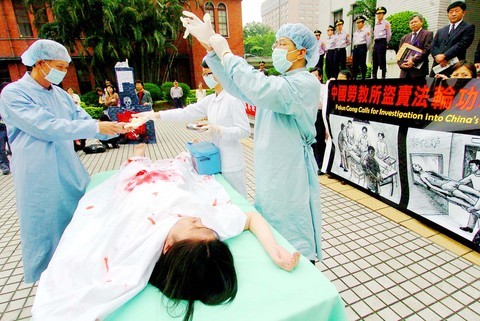The legislature yesterday passed a provisional resolution calling on international human-rights organizations to investigate what it said was China's "monstrous crime" of harvesting the organs of Falun Gong practitioners.
"We urged that the United Nations and other international human-rights organizations send their observers to China to inspect the situation and demand that the Chinese authorities tell the truch about this matter," the resolution states.
The draft resolution, backed by about 50 lawmakers from across party lines, came in the wake of an appeal by a group of Taiwanese Falun Gong practitioners.

PHOTO: LO PEI-DER, TAIPEI TIMES
The group performed a play showing how organs were harvested from living bodies at a press conference in front of the Legislative Yuan yesterday.
"There has been speculation that more than 10,000 Falun Gong practitioners kept in China's concentration camps might have been killed so that their organs could be harvested," said Chang Ching-hsi (
Chang made the remarks based on a report released by Voice of Hope Broadcast, a media outlet linked to the Falun Gong, in which doctors in China's transplant centers in Hubei, Shanghai, Beijing, Shaanxi and Liaoning said there would be many organs available for transplant by the end of this month.
"I bet you that the organs will be very fresh and most of them will be from young people aged 20-30 years old. If you want [an organ transplant], you had better come before May 1," one doctor said in the report.
In response to a reporter's question, the doctor confirmed that the livers or kidneys were coming from labor camps where many Falun Gong practitioners are kept.
"Yeah, but what we care about is the quality, not the source," the doctor said.
Chang showed the taped interview with the doctor at the press conference.
He accused the Chinese authorities covering up evidence that Falun Gong practitioners are being killed to develop the organ transplant industry.
The Falun Gong-lined Epoch Times Web site reported on March 9 that organs were being harvested from Falun Gong practitioners in Sujiatun District, Shenyang City.
"We know that there are about 36 other labor camps in China similar to the one in the Sujiatun. We called on the international community to force the Chinese authorities to say how many camps they have, how many people have been executed and how many organs have been harvested," the provisional resolution states.
Democratic Progressive Party (DPP) Legislator William Lai (賴清德), who initiated the provisional resolution, said every government should boycott harvested organs from China by barring their citizens from having transplant surgery in China.
He said an official resolution will soon be approved by the legislature in order to make it more effective.

ANOTHER EMERGES: The CWA yesterday said this year’s fourth storm of the typhoon season had formed in the South China Sea, but was not expected to affect Taiwan Tropical Storm Gaemi has intensified slightly as it heads toward Taiwan, where it is expected to affect the country in the coming days, the Central Weather Administration (CWA) said yesterday. As of 8am yesterday, the 120km-radius storm was 800km southeast of Oluanpi (鵝鑾鼻), Taiwan’s southernmost tip, moving at 9kph northwest, the agency said. A sea warning for Gaemi could be issued tonight at the earliest, it said, adding that the storm is projected to be closest to Taiwan on Wednesday or Thursday. Gaemi’s potential effect on Taiwan remains unclear, as that would depend on its direction, radius and intensity, forecasters said. Former Weather Forecast

As COVID-19 cases in Japan have been increasing for 10 consecutive weeks, people should get vaccinated before visiting the nation, the Centers for Disease Control (CDC) said. The centers reported 773 hospitalizations and 124 deaths related to COVID-19 in Taiwan last week. CDC Epidemic Intelligence Center Director Guo Hung-wei (郭宏偉) on Tuesday said the number of weekly COVID-19 cases reported in Japan has been increasing since mid-May and surpassed 55,000 cases from July 8 to July 14. The average number of COVID-19 patients at Japan’s healthcare facilities that week was also 1.39 times that of the week before and KP.3 is the dominant

The Chinese Communist Party’s (CCP) working group for Taiwan-related policies is likely to be upgraded to a committee-level body, a report commissioned by the Mainland Affairs Council (MAC) said. As Chinese President Xi Jinping (習近平) is increasingly likely to upgrade the CCP’s Central Leading Group for Taiwan Affairs, Taiwanese authorities should prepare by researching Xi and the CCP, the report said. At the third plenary session of the 20th Central Committee of the CCP, which ended on Thursday last week, the party set a target of 2029 for the completion of some tasks, meaning that Xi is likely preparing to

US-CHINA TRADE DISPUTE: Despite Beijing’s offer of preferential treatment, the lure of China has dimmed as Taiwanese and international investors move out Japan and the US have become the favored destinations for Taiwanese graduates as China’s attraction has waned over the years, the Ministry of Labor said. According to the ministry’s latest income and employment advisory published this month, 3,215 Taiwanese university graduates from the class of 2020 went to Japan, surpassing for the first time the 2,881 graduates who went to China. A total of 2,300 graduates from the class of 2021 went to the US, compared with the 2,262 who went to China, the document showed. The trend continued for the class of 2023, of whom 1,460 went to Japan, 1,334 went to